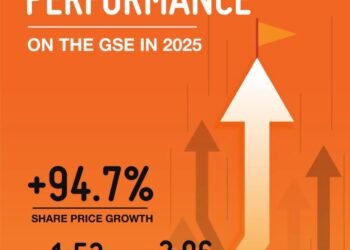Ghana’s telecom industry has been ranked among Sub-Saharan Africa’s (SSA) top five best performers in terms of recent developments and fairly lower risks for investment opportunities in the industry.
Based on the rankings, this reflects a score of 53.1 out of 100 according to the Telecommunication Risk/Reward. This score is higher than the score of 52.8 in the previous quarter. Accordingly, countries such as South Africa (1st)- 59.4, Nigeria (2nd)- 57.1, Gabon (3rd)- 54.4 and Senegal (4th)- 53.3 took the top spots.
Furthermore, on account of global rankings, Ghana ranked 77th, placing it above regional peers such as Kenya (82nd), Côte d’Ivoire (94th), Angola (103rd). Albeit, Ghana was outpaced by countries such as South Africa (60th), Nigeria (68th), Gabon (71st) and Senegal (76th).
Separately analyzing the country’s industry reward index was however, below 50.0 points (48.4) while the industry risk index was 63.9 points out of a potential100.
According to Fitch Solutions, “this is mainly due to positive demographic services as well as new mobile market growth data which show promising uptake of advanced services as the market grows increasingly receptive to new technologies, applications and services.”
Nonetheless, Fitch Solutions is of the view that tax hikes aimed at the sector may affect investment strategies, especially, considering the nature of investments required in advanced services.
“Increasing taxes aimed at the sector risk impacting operators’ investment strategies, particularly related to advanced services.
“These risks will be particularly heightened as operators have faced increasing operational costs on the back of theft and damage to critical telecoms infrastructure around the country.”
Moreover, a regional analysis reveals that SSAs overall score stands at 40.1 out of 100 points in the RRI index. This shows an underperformance compared to the global average of 50.0 points.
Regional analysis in the telecom industry
A regional average of 39.3 points for Industry Rewards reflects the continued growth of the broadband segment. Also, this increases the usage levels for streaming services and mobile financial services since the onset of the Covid-19 pandemic in the region.
According to Fitch Solutions, a lot of telecom markets in the region are also making strides towards 5G following launches in Lesotho, Mauritius, Seychelles, South Africa and Togo.
The region’s Industry Risks score remain unchanged at 46.6 on average, the best performing of the four pillars (industry rewards, country rewards, industry risks, country risks).
As a result, this reflects developments such as the conclusion of long-running licencing processes to improve competitive dynamics in key markets. For instance, like Ethiopia, which recently had its government select the Global Partnership for Ethiopia (GPE) as the country’s first alternative telecoms player. The Global Partnership for Ethiopia consists of several leading telecoms and technology investors: Safaricom, Vodafone Group, Vodacom Group, CDC Group and Sumitomo Corporation.
With a Country Rewards score of 45.7, Fitch Solutions indicates that positive demographic factors bode well for regional players’ focus on data and value-added services. These factors include youthful populations and an increasingly modernizing customer base, bode well for regional players’ focus on data and value-added services.
The region’s weakest performance is at the Country Risks pillar, scoring 26.7 out of 100 points as heightened social and political instability continues.
According to Fitch Solutions, this has to do with a number of countries facing security risks as well as the ongoing Covid-19 pandemic. More so, this pertains to the resultant economic hardships from the pandemic as a number of economies enter recessions, weighing on prospects for operators to lift customer spend on telecoms services.
READ ALSO: Extortionary acts by enforcers, cause of ineffectiveness of property tax revenue collection























